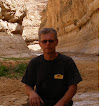8.02.2014,
Day 1086,
The Journey : Salta - Tilcara - Purmamarca ( 258 km),
119,000 km since the beginning of the journey.
And then on the road again. Meanwhile the big heat wave has been slightly diminishing and it has been even raining, but Saturday morning is sunny again.

Before leaving the city I manage to get a bit more colored photo of the February 20 th Monument. The Battle of Salta took place on February 20, 1813 during the Argentine War of Independence. You can read more about the battle here http://en.wikipedia.org/wiki/Battle_of_Salta.

The Monument of Giant Armadillo.

Driving northwards the road takes along the mountainsides and through a real rainforest.

Emblase Las Maderas, ie the reservoir. After the town of El Carmen the road is changing wider and there is more traffic.
Then - a police check post, the usual one. Takes almost no time there. Just to present the necessary documents. But the next check-post offers a nice surprise. Having replied that I was heading to Tilcara I am handed over a nice set of tourist brochures.
And from the Tourist Information next to the road I get another tourist map.

Quebrada de Humahuaca http://en.wikipedia.org/wiki/Quebrada_de_Humahuaca is a UNESCO World Heritage Site since 2003.
From Wikipedia : The region has always been a crossroads for economic, social and cultural communication. It has been populated for 10,000 years, since the first settlement of the first hunter- gatherers, which is evidenced by substantial prehistoric remains. It was a caravan road for the Inca Empire in the 15th century, then an important link between the Viceroyalty of the Río de la Plata and the Viceroyalty of Peru, as well as a stage for many battles of the Spanish War of Independence.

Rio Grande. At the moment - not much water in the river.








San Francisco de Tilcara, or simply Tilcara is a small town, the main attraction of which is the Pucara de Tilcara - partially restored ruins of the fortress from the pre Incas period. The place has been inhabited for a long time, the first traces of human activity are more than 10,000 years old.

At noon the city is empty. Completely empty.




Restored buildings.



The enclosures for llamas.

But the pyramid is not from the time of the Incas or earlier. It was built in the year of 1935, and is dedicated to the archaeologists who studied this region. (Juan D. Ambrosetti, Salvador Debenedetti, Eric Boman).



Right here - the Botanic Garden with cacti.

Piedra Campana –a rock that makes the sounds of church bells I 've come across something similar in the past, in Zimbabwe, near Bulawayo there are Khami Ruins and some rocks there make the sound of a church bell as well. http://tarmo-rtw.blogspot.com/2011/12/zimbabwe-khami-ruins-ja-matobo-hills.html



The cemetery Maimara is next to the great road.





Cuesta de Lipan and the road along the mountainside.

In the altitude of 3794 m it is cooler, the jacket should be put on.



It is necessary to get used to the height gradually – so the nights should be spent lower. At least 1,000 m.downwards. The high altitude disease is not a laughing matter at all.

Immediately behind the sign of Purmamarca there is a camping, the town itself is a few kilometers away. The overnight price is 25 pesos, and there was said to be both - hot water and electricity. Then back to Purmamarca to find something to eat.

A large market in the center square.

And food is waiting by the street.

I'm going back to the camping, and discover that over and over again something new can be spotted. On the right there is the gate to the campsite, and behind it - a large square as usual. But the toilet is on the other side of the road to Chile. The same little house beside the road on the left.
February 8, GPS trail
View Larger Map



No comments:
Post a Comment